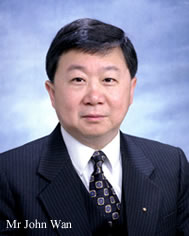PDG John Wan – Continuity – December 1999
Continuity
Taking Stock and Looking Ahead
(December 1999 Issue)
This is the last month of the year, of the decade, of the century, and many would not dispute, of the millennium. Many people would be busier than ever preparing for the Y2K, and planning and organizing millennium parties, extravaganzas and what not. When the hurly-burly’s done and when the witches meet upon the heath, one hopes that all the heartaches and headaches would be worth the while and that the human race would emerge the wiser and not simply older.
It is perhaps not a coincidence that Rotary has not designated the month of December for any specific purpose. There are so many things to be done this month, even in an ordinary year and apart from the obligatory Christmas parties and New Year celebrations. This is the time Christians would prepare themselves for the coming of Christ celebrations, accountants would prepare books for their principals, and for businessmen to take stock generally of their businesses and develop and fine-tune strategies for the future. For Rotary, this is the time of the year when all clubs would confirm or elect their leadership for the Rotary year to begin in another six months and to elect or at least identify a club president for the year 18 months away. These are the rules, well tried and tested for nearly a century as sound and good, and which have helped provide the very much cherished continuity in our organization.
The importance of planning to the success of an organization can never be over emphasized. Management guru Peter Drucker hails planning as one of the most if not the most critical management functions. The many rules and regulations evolved over the years for Rotary are there to enable Rotarians and clubs to be more effective in achieving the Objects of Rotary. They are our planning tools. Now, tools are only as effective as the users using them. They can do wonders in the hands of master craftsmen, but would degenerate into blunt instruments when left to ignorant and inexperienced apprentices. This is why we need to look at our rules and review them continuingly.
At Rotary International, an RI Programs and Emphases Review Committee has been established to review RI’s current policies and procedures for the development, implementation and evaluation of RI programs, emphases and presidential initiatives, and to suggest ways in which RI’s program activities can be more effective in supporing the work of Rotary clubs. It is chaired by Past President Cliff Dochterman and Past Governor Jason Yeung is a member. The Committee started work in July, and already has recommended, among other things, to discontinue the traditional terms of “programs,” “emphases,” “activities” and “initiatives” and replace them by “Structured Programs” which are organized activities with a framework and guidelines recommended by the RI Board, and “Menu of Service Opportunities” which are issues and concerns identified as recommended service priorities for a specified period. The Committee has also recommended that Rotary clubs should be encouraged to invite qualified Rotaractors into membership of their clubs or to consider sponsoring a new Rotary club for them.
Similarly, at club level, there is nothing to stop Rotary clubs to review their club plans and objectives, or club programs and emphases to ensure that they are atuned to present day needs and that they are relevant to the needs and aspirations of the membership, and more importantly, that their programs meet community concerns.
I can no better underline the importance of taking stock and looking ahead than to summarize what a past president wrote in an article for Rotary on the Internet which I reproduced in full in Issue 6 of my letters. Writing on what he would do if he were president again, this past president said he would re-orientate his membership to emphasize the basics of Rotary; improve the weekly program; develop effective program to reduce the cost of being a Rotarian; promote projects that would involve more membership and cost less; emphasize the president’s role as a club member; review membership policies with emphases on young qualified candidates; and plan earlier. Yes, plan earlier. This is perhaps his single most important message. The past president ended by reminding incumbent presidents how lucky they were, for they still had time to ensure that their plans would materialize. He then went on to say that incoming presidents were luckier for they could begin right now in preparing themselves for the term ahead.
Perhaps the best time to start planning is now, before it is too late. Let me stress that the task does not rest on the president or board members alone. Each member should contribute towards the planning and review process. I would further stress that this is not just a process to rid the system of the ancient, which is not what continuity is about. Rather, one should be looking to retain programs that are good and to bring in new ways and means that can rejuvenate the membership and hence the club, which is what continuity is all about.
ENDS

